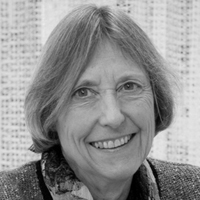Nancy Kleckner

Herchel Smith Professor of Molecular Biology at Harvard University
Professor Kleckner earned her undergraduate degree from Harvard, where she worked with Matthew Meselson on recombination in bacteriophage λ. She got her PhD from the Massachusetts Institute of Technology (MIT) working with Ethan Signer on DNA replication, also λ. In postdoctoral work with David Botstein at MIT, she showed that bacteria possessed segments of DNA encoding antibiotic resistance genes that ‘jump around’ from site to site on the chromosome, a process known as DNA transposition.
A member of the Harvard faculty since 1977, Dr. Kleckner's research began with genetic and biochemical experiments on DNA transposition. She elucidated the cut-and-paste nature of the transposition process, the unique chemistry of the reaction and the roles protein/DNA complexes (transpososomes). She concomitantly elucidated regulatory processes that, collectively, allow the transposon (IS10/Tn10) to stably inhabit its host. This work included identification of the first small anti-sense RNA that inhibits protein translation (of IS10 transposase) and the discovery that cellular conditions alter transposition outcome by modulating mechanical stress in a transpososome DNA loop.
Her research then transited to new subjects. She initiated modern approaches to analyzing chromosomal events of meiosis, the modified cellular program that yields haploid gametes (sperm and egg) for sexual reproduction. This work uncovered the molecular nature of meiotic recombination and showed that homologous chromosomes can identify one another and pair even without recombination. Her group carried out the first chromatin immunoprecipitation mapping of a chromosome-associated proteins and her then-post-doctoral-fellow Job Dekker invented chromosome conformation capture (3C) methodology, which has revolutionized analysis of chromosome architecture and its role in chromosome function.
Her studies in meiosis led Kleckner to propose a new conceptual view in which chromosomes are considered as mechanical objects. By this idea, chromosome functionalities are governed by accumulation, relief and redistribution of mechanical stress, with key chromosomal molecules acting as sensors and transducers of such stress. This idea emerged from a stress-based model for how chromosomal features become evenly spaced along chromosomes, and her group recently found that Topoisomerase II, a mediator of mechanical stress, is involved in such a process. Her laboratory has also pioneered 4D (3D over time) analysis of whole chromosome dynamics. 4D studies in both mammalian cells and in the bacterium E.coli have defined global dynamic behavior that involves cyclic accumulation and relief of stress. Mammalian analysis concomitantly defines, for the first time, how chromosomes develop the short, compact organization required for segregation of duplicated copies to daughter cells.
Dr. Kleckner was awarded the GSA Medal of the Genetics Society of America in 1990 and elected to the American Academy of Arts and Sciences in 1991, to the U.S. National Academy of Sciences in 1993, and as a Foreign Associate member of the European Molecular Biology Organization in 2004. She has founded international meetings in the fields of DNA transposition, bacterial chromosomes and meiosis. At Harvard University, she is the founder of the PhD Track in Engineering and Physical Biology (EPB).
Kleckner's article
April 2015
